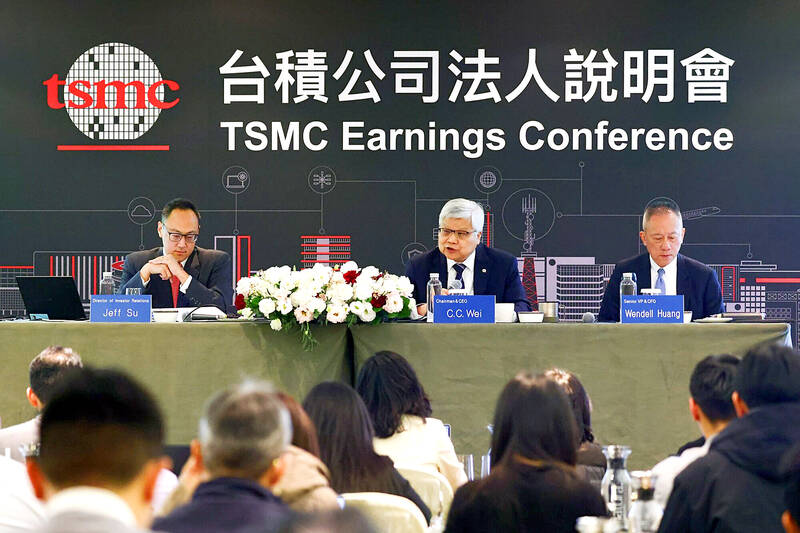Taiwan Semiconductor Manufacturing Co (TSMC, 台積電), a major chip supplier to Nvidia Corp and Apple Inc, yesterday said it aims to grow revenue by about 25 percent this year, driven by robust demand for artificial intelligence (AI) chips.
That means TSMC would continue to outpace the foundry industry’s 10 percent annual growth this year based on the chipmaker’s estimate.
The chipmaker expects revenue from AI-related chips to double this year, extending a three-fold increase last year. The growth would quicken over the next five years at a compound annual growth rate of 45 percent, fueled by strong demand for the high-performance computing (HPC) segment, TSMC said.

Photo: Annabelle Chih, Bloomberg
AI accelerators and AI graphic processing units contributed about 15 percent to the company’s overall revenue last year, it said.
“We can continue to outperform the industry’s growth. 2025 will be another strong growth year for TSMC,” company chairman and CEO C.C. Wei (魏哲家) told an earnings conference in Taipei.
Over the next five years, revenue would grow at a compound annual growth rate of 20 percent, Wei said.
Gross margin would stand at 53 percent, judging the impact from higher costs of overseas fabs and macroeconomic uncertainty, TSMC said.
Investors are still concerned about the sustainability of the AI boom amid speculation that Nvidia was scaling back orders for TSMC’s advanced packaging chip-on-wafer-on-substrate (CoWoS) technology for AI chips.
“There are a lot of rumors,” Wei said. “We are working hard to meet the requirements of customer’s demand. Cutting orders? That won’t happen. Actually, it continues increasing.”
TSMC continues to face challenges in solving CoWoS capacity constraints, after doubling capacity last year and the year before.
To cope with the growing demand for AI and advanced chips, TSMC is hiking capital spending by about 41 percent this year to a record-high of US$38 billion to US$42 billion.
The US’ latest curbs on chip exports, primarily AI chips, to China would not affect TSMC’s strong growth prospects as it expects “very minimal impact” from the ban, Wei said.
AI chips made up an insignificant part of its Chinese customers’ businesses, he said.
TSMC is seeking to gain permission from the US government to supply non-AI chips to China, including those used in cars, consumer electronics and cryptomining machines, Wei said.
Washington believes those non-AI chips fall in the normal business categories, he said.
Asked about TSMC’s deployment of 2-nanometer process technology in the US, Wei said all new technologies would be first built in Taiwan due to ever-growing technology complexity that requires prompt research-and-development support. It is not relevant to government restrictions from Taiwan, he said.
Revenue this quarter would decline about 5.5 percent sequentially to between US$25 billion and US$25.8 billion, compared with US$26.88 billion last quarter, TSMC said, citing sagging smartphone demand.
Robust demand for AI chips would partially offset the declines, it said.
Gross margin is to be between 47 and 49 percent this quarter, versus 49 percent last quarter, the chipmaker forecast. TSMC attributed costs for ramping 2-nanometer chip production and CoWoS capacity expansion, as well as higher costs from overseas factories, to lower gross margin this quarter.
TSMC reported a record net profit of NT$374.68 billion (US$11.38 billion) for last quarter, soaring 57 percent year-on-year, or up 15.2 percent quarter-on-quarter, thanks to robust demand for advanced 3-nanometer and 5-nanometer chips.
That brought the company’s total net profit last year to NT$1.17 trillion, surging 39.9 percent from NT$838.5 billion in 2023. That translated to earnings per share of NT$45.25, up from NT$32.34 the previous year.

In Italy’s storied gold-making hubs, jewelers are reworking their designs to trim gold content as they race to blunt the effect of record prices and appeal to shoppers watching their budgets. Gold prices hit a record high on Thursday, surging near US$5,600 an ounce, more than double a year ago as geopolitical concerns and jitters over trade pushed investors toward the safe-haven asset. The rally is putting undue pressure on small artisans as they face mounting demands from customers, including international brands, to produce cheaper items, from signature pieces to wedding rings, according to interviews with four independent jewelers in Italy’s main

Macronix International Co (旺宏), the world’s biggest NOR flash memory supplier, yesterday said it would spend NT$22 billion (US$699.1 million) on capacity expansion this year to increase its production of mid-to-low-density memory chips as the world’s major memorychip suppliers are phasing out the market. The company said its planned capital expenditures are about 11 times higher than the NT$1.8 billion it spent on new facilities and equipment last year. A majority of this year’s outlay would be allocated to step up capacity of multi-level cell (MLC) NAND flash memory chips, which are used in embedded multimedia cards (eMMC), a managed

Japanese Prime Minister Sanae Takaichi has talked up the benefits of a weaker yen in a campaign speech, adopting a tone at odds with her finance ministry, which has refused to rule out any options to counter excessive foreign exchange volatility. Takaichi later softened her stance, saying she did not have a preference for the yen’s direction. “People say the weak yen is bad right now, but for export industries, it’s a major opportunity,” Takaichi said on Saturday at a rally for Liberal Democratic Party candidate Daishiro Yamagiwa in Kanagawa Prefecture ahead of a snap election on Sunday. “Whether it’s selling food or

In the wake of strong global demand for AI applications, Taiwan’s export-oriented economy accelerated with the composite index of economic indicators flashing the first “red” light in December for one year, indicating the economy is in booming mode, the National Development Council (NDC) said yesterday. Moreover, the index of leading indicators, which gauges the potential state of the economy over the next six months, also moved higher in December amid growing optimism over the outlook, the NDC said. In December, the index of economic indicators rose one point from a month earlier to 38, at the lower end of the “red” light.